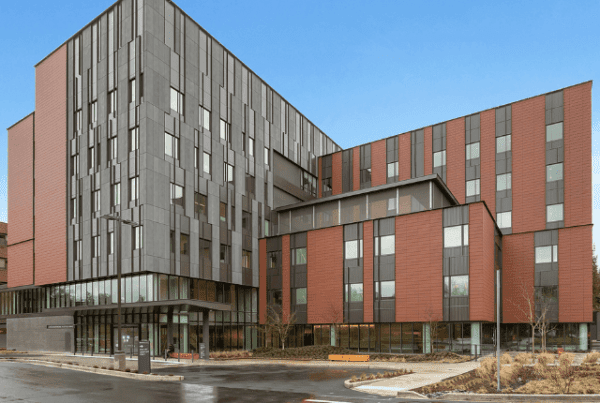A beautiful baby girl was born at UW Medical Center two weeks ago. When I hold her in my arms, I marvel at the unlimited opportunities that lie before her. While I know that this baby, who is my third grandchild, will face challenges in choosing the path that is right for her, I am hopeful that she will achieve her dreams. In my mind, I can already see her as a teacher, a healthcare professional or a justice on the Supreme Court!
My confidence in the future of UW Medicine is grounded in a similar sense of optimism. I believe we are successful not only because we are united in our mission to improve the health of the public, but also because we are willing to take on the hardest challenges as a community.
Our most recent fiscal year (FY 2019) that ended on June 30, 2019, provides many examples of this strength. We started the year with the Financial Improvement & Transformation (FIT) program as our top priority to achieve a more solid financial footing. It required a commitment to plan and execute numerous system-wide and local initiatives to increase revenue and reduce costs. Due to the hard work of thousands of individuals, the second year of FIT has been successful. We ended the year ahead of our budget goal. While this is very good news, it is not the end of the challenge. Your continued support is needed to achieve the FIT goals for this year and beyond as we work to achieve a sustainable operating margin in the 3% to 5% range.
We faced an unexpected challenge in FY 2019 when a radioactive source was breached during its removal from the Research & Training Building on the Harborview campus by U.S. Department of Energy contractors in early May. To deal with the many components of this challenge, UW School of Medicine leaders established a major collaborative effort with UW Administration, the Washington State Department of Health and the U.S. Department of Energy. This team acted immediately to assure the safety of our researchers, staff and neighbors as well as to evacuate animals from the vivarium in the building. Since the breach, regular monitoring has indicated there is no health risk. There has also been nonstop work to decontaminate the building and relocate research labs to offsite locations. While I know that this situation continues to be difficult for many of our researchers, I am grateful for the collaboration shown by their colleagues in offering to share lab space while the building remains closed.
Research grant funding remains very competitive, and our researchers face many challenges. By working together across academic departments with multidisciplinary approaches, UW Medicine researchers took important steps to improve health in FY 2019. We have more than 1,000 faculty who are lead investigators on research projects, and they brought in more than $1 billion in funding for the sixth consecutive year. This outstanding research continues to make UW Medicine a global leader in finding new approaches for diagnosis, treatment and prevention and in applying these discoveries to patient care. These research programs are truly accelerating the application of basic science discoveries to improving the health of the public.
The UW School of Medicine received full accreditation from the Liaison Committee on Medical Education (LCME) in FY 2019 based on a comprehensive self-study and site visit. Many of you were involved in this challenging process, and I thank you for your time and commitment. While LCME accreditation speaks to the excellence of the medical school, the committee also identified several challenges in the learning environment that require our ongoing attention. We must do better to make our school a model for treating all learners, faculty and staff with complete respect while supporting a dynamic, active learning environment.
Our Healthcare Equity Blueprint takes on the challenge of institutional racism and other forms of discrimination. With this action plan, we are working to make UW Medicine more inclusive as an employer and more effective in delivering equitable care. UW Medicine is committed to the safety and security of our entire community, and we are engaged with other major health centers as part of the national TIME’S UP Healthcare movement. I am pleased that all four hospitals received the 2019 LGBTQ Healthcare Equality Leader designation from the Human Rights Campaign Foundation.
To compete more effectively in the local healthcare market, we launched a new brand campaign in FY 2019 that highlights what makes us unique with the tagline: A higher degree of healthcare. This campaign will increase public awareness of the quality of care provided by UW Medicine’s healthcare professionals and the importance of the direct connection of our hospitals and clinics with the medical school’s outstanding research, teaching and training programs. Integration of clinical, teaching and research activities is vital for UW Medicine to advance our mission of improving health.
When the University of Washington’s Be Boundless Campaign was announced in 2016, UW Medicine was given the challenge of raising $2 billion toward the overall $5 billion goal. With generous support from employees and members of the community, Accelerate: The Campaign for UW Medicine had a record year for fundraising and has now surpassed the initial campaign goal.
I know that each of you faces other challenges in your daily work. Whether they are expected or unexpected, I encourage you to embrace them as an opportunity to join with your colleagues in finding innovative solutions that will lead to long-term success for UW Medicine.
Thank you for your commitment to our mission of improving the health of the public and your outstanding work that will create a healthier world for the next generation.
Sincerely,
Paul G. Ramsey, M.D.
CEO, UW Medicine
Executive Vice President for Medical Affairs and
Dean of the School of Medicine,
University of Washington

